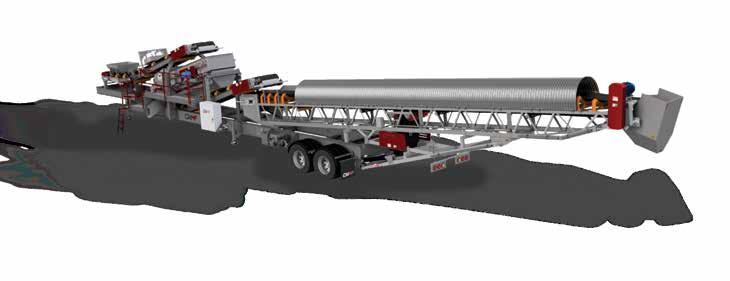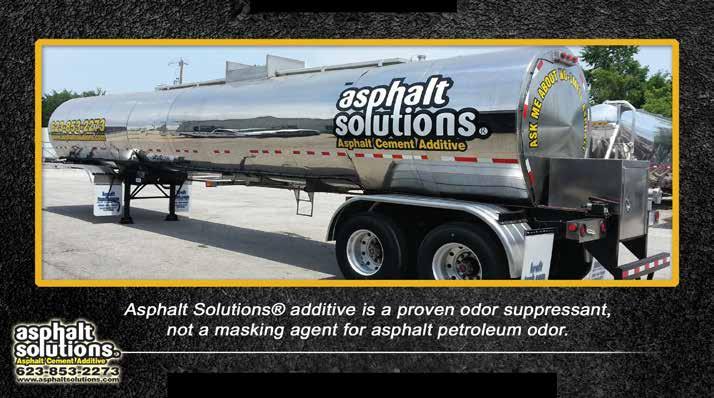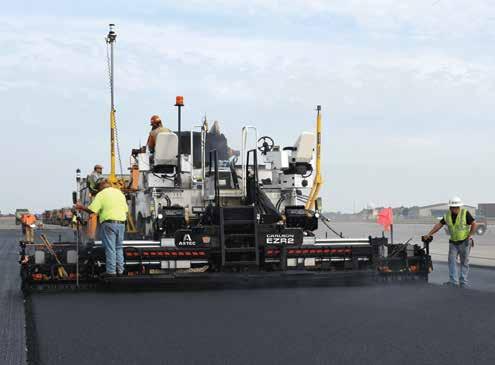
3 minute read
Lift Your Operations Out of the Stone Age
Apex Scale Ticketing Software combined with simple site automation technology gets your trucks in and out in record time.
With Apex You Can:
• Eliminate gaps in communication between dispatch and back office
• Simplify quote-to-cash processes by integrating with ERP
• Reduce time at plant by streamlining and automating your processes
• Reduce errors throughout your entire order cycle with digital tickets
• Capture complete visibility to make more accurate decisions, quicker
• Support business growth with one reliable, scalable, and maintainable system
J. Fragale & Sons’ bread and butter has always been residential paving. “We’ve been doing residential work for generations and we’re set up to do it very well,” Fragale said.
For example, after reading “Measure Yield to Maximize Milling Benefits” in AsphaltPro, Fragale began using the Measure Map app recommended by Intercounty Paving Co’s Tyler Spano. “My father has always paid so much attention to tracking yield, but I never understood how important it is until I started running the paver myself,” Fragale said. “Just because the mix weighs the same, doesn’t mean it lays the same.”
The introduction of the Measure Map app made following that existing best practice easier, Fragale said. “I used that app on our Harwinton job and our yield was right on the money every time,” he said. Although they wheeled off and marked 100-foot stations, the app was right on, Fragale added.
The company has also invested in its first GPS machine, a Caterpillar 315 excavator. And, Fragale is in the process of implementing a paperless estimating process. He’s also been involved in attracting the next generation of the company’s workforce.
“A lot of companies are having a hard time finding employees, but that hasn’t been the case for us,” Fragale said. Part of it, he added, is Fragale’s own age. “I’m younger, too,” he said, “and both my friends and friends of friends have come to work for us.”
Fragale also credits the company’s Instagram account. “I’ve hired two guys directly from Instagram that have been with the company for years now,” Fragale said. “Even hires that don’t come directly from Instagram often look at our page to see what we’re about.”
For example, a friend of a friend found J. Fragale & Sons’ Instagram and thought he could see himself on a paving train and came to work for the company. “This is where younger people are putting their time and finding out about new things,” Fragale said. “And that’s how we got their attention.”
Although Fragale said an Instagram account might not have much impact on sales, he thinks it’s a powerful and underutilized tool in terms of hiring. “We’re just documenting what we do, so potential employees will already have an idea of what we’re all about.”
When it comes to retaining good employees, Fragale follows the family way. “There’s no mentality of ‘That’s his job’ on our crew,” Fragale said. “If someone needs a helping hand, my father or myself are going to be the first ones to go over there and do it. No one’s above any job.”
Nearly 80 years since Joseph Fragale Senior set the precedent, J. Fragale & Sons continues to show what can be done with a strong back and a good work ethic.
J. Fragale & Sons takes pride in its quality and attention to detail. “We're not the kind of company that just comes in to paint it black.”
Learn More
Jake Fragale’s Grading Principles
Properly preparing before paving has been an important lesson passed down to Jake Fragale. “Good prep work is how we make asphalt last,” Fragale said. Hitting the grade is an integral aspect of preparing to pave. “I like to think of paving as laminating your grade.”


To spread this lesson throughout J. Fragale & Sons, Fragale has laid out a series of grading principles. Here is an abbreviated version of his guidelines.
1. Know where the grade is.
“Everything in grading can be boiled down to cuts and fills,” he said. “You can't identify cuts and fills until you know where the desired grade is.”
2. Look at cuts and fills.
“Now that you know where the grade needs to be, you can identify what needs to be done,” Fragale said. For example, does material need to be removed to install a suitable base? Can fill be utilized on site to avoid trucking costs? Where are there low areas that require more material? “Before a bucket or blade hits the ground these questions need answers.”
3. You can’t grade air.
“Compaction is key,” he said. “Grade met that is not compacted is worthless.” Fragale instructs that, when fine grading a filled area, be sure to compact first. Sometimes, he adds, a rough grade is necessary before compacting.
“Get the material close to grade. Compact. Grade,” he said. “Do this so you can ‘cut to grade.’ Make this cut, then check. Small adjustments may have to be made. Make them.”
4. Check your work.
“Did you hit your marks? Is grade constant? Are your transitions smooth? Is the grade compacted?” Fragale asks. “Answer yes to these questions.”






